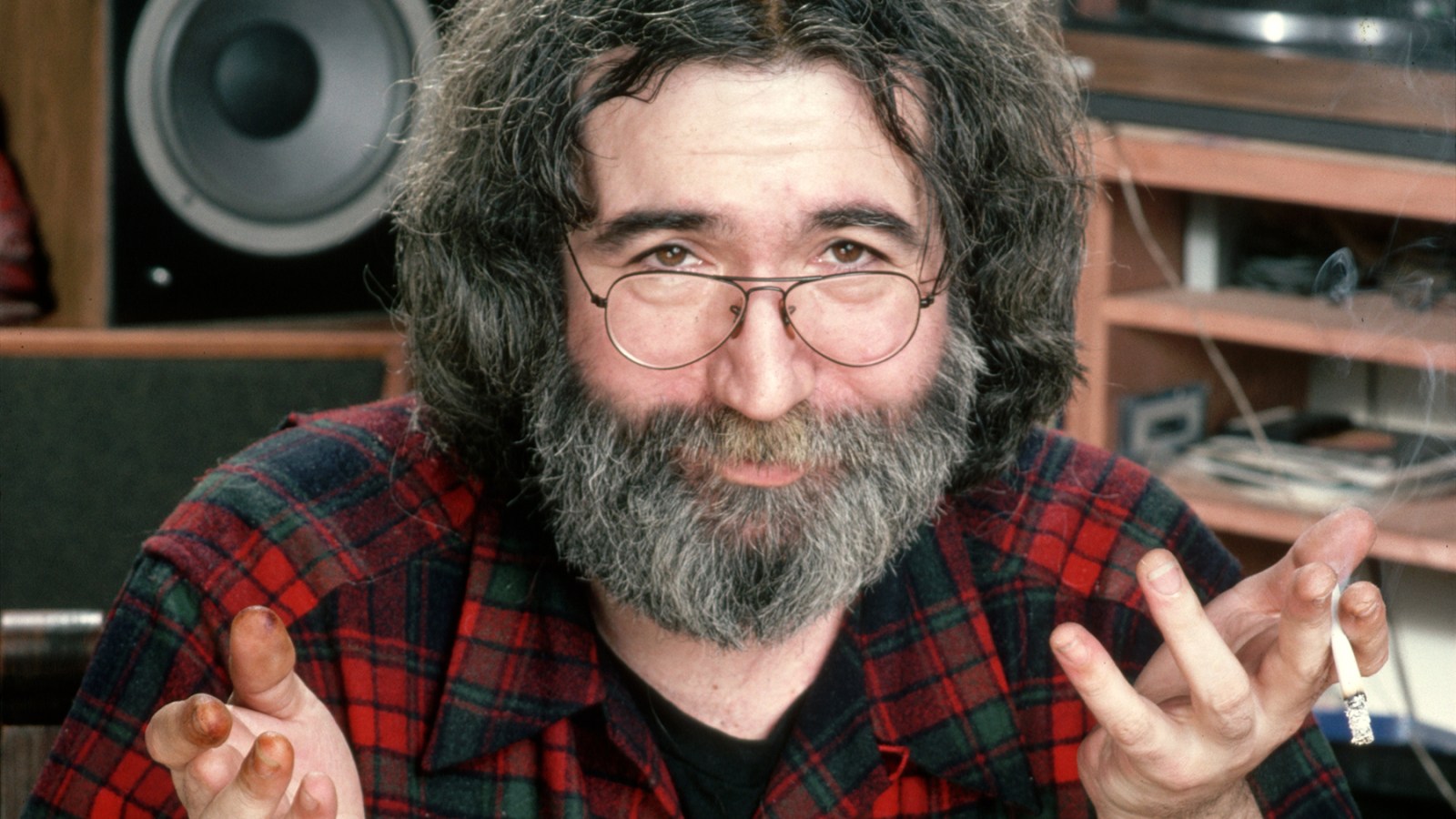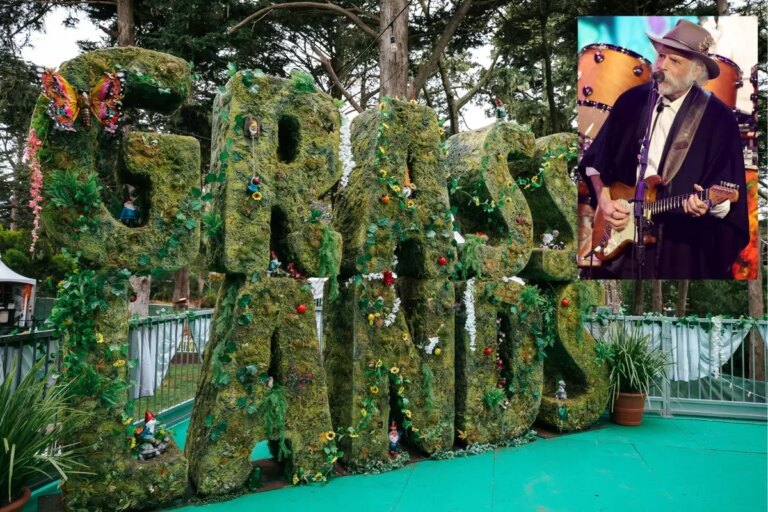Jerry Garcia isn’t just one of the most beloved rock stars ever, a legendary guitar player, and leader of the greatest rock band of all time from its inception in 1965 up through his passing in 1995. The Grateful Dead co-founder was also a font of casual philosophical wisdom, offering up pearls of insight throughout his life on anything from religion to finance to art. Here are some classic nuggets of Garcia genius to guide you through life.
On God
“There was one dream when I thought everybody on Earth had been evacuated in flying saucers and the only people left were these sort of lifeless automatons that were walking around, and there’s the kind of sound of that hallow mocking laughter, when you realize that you’re the butt of the universe’s big joke.” —1989
“The date that holds significance for me is 2012. That’s Terence McKenna’s alpha moment, where the universe undergoes its most extraordinary transformations. He talks about these cycles, which, in each epic, more happens than in all previous time…. They’re huge transformations in consciousness. This is going to peak in 2012.” —1993
“After I came out of my coma, I had this image of myself as these little hunks of protoplasm that were stuck together kind of like stamps with perforations between them that you could snap off. They were run through with neoprene tubing, and there were these insects that looked like cockroaches which were like message-units that were kind of like my bloodstream. That was my image of my physical self, and this lasted a long time.” —1994
I have been spoken to by a higher order of intelligence – I thought it was God. It was a very personal God, in that it had exactly the same sense of humor that I have. I interpret that as being the next level of consciousness.” —1994
On Drugs
“Being high, each note is like a whole universe. And each silence. And when you’re playing and you’re high on acid in these scenes, it is like the most important thing in the world. It’s truly, pshew, cosmic.” —1972
“To get really high is to forget yourself – and to forget yourself is to see everything else – and to see everything else is to become an understanding molecule in evolution, a conscious tool of the universe. And I think every human being should be a conscious tool of the universe. That’s why I think it’s important to get high.” —1972
“I’m the sort of person that will just keep going along until something stops me. For me and drugs, the bust helped. It reminded me how vulnerable you are when you’re drug dependent. It caught my attention. It was like, ‘Oh, right: illegal!’” —1987
“Drug use is kind of a cul-de-sac: It’s one of those places you turn with your problems, and pretty soon, all your problems have become that one problem. Then it’s just you and drugs.” —1987
“In my life, all kinds of drugs have been useful to me, and they have also been a hindrance to me. As far as I’m concerned, the results are not in.” —1991
“Q: If you were made Clinton’s drug-policy adviser, what would you do?
A: I would advise him to make everything legal immediately. Take the profit out of it and the whole criminal structure will collapse. The next part is the health aspect, making drugs that are clean and in knowable, understandable doses. Why not spend research money on making drugs that are good for you, that are healthy? Is the problem that we don’t like people changing their consciousness? I don’t think that’s a good enough reason not to have drugs.” —1994
His Peers
“Maybe Chuck Berry was the first rock musician because he was one of the first blues cats to listen to records, so he wasn’t locked into the blues idiom. Nobody has to fool around with musty old scores, weird notation and scholarship bullshit. You can just go into a record store and pick a century, pick a country, pick anything, and dig it, make it a part of you, add it to the stuff you carry around and see that it’s all music.” —1969
“I knew Janis eight years ago, and she was singing her heart out in the funkiest places you could imagine, with abscesses on her arms, dumpy and strung out, head all fucked up, wearing the plainest, most nondescript clothes you’ve ever seen. She was really singing, and nobody was even listening.” —1971
“Dylan was able to tell you the truth. He was able to talk about the changes that you’d go through, the bummers and stuff like that – and say it in a good way, the right way. Back in the folk music days, I couldn’t really dig this stuff, but on Bringing It All Back Home he was really saying something that I could dig, that was relevant to what was going on in my life at the time. Whether he intended it that way or not is completely unimportant.” —1972
“The Beatles were real important. They were a little model, especially the movies – the movies were a big turn-on. Just because it was a little model of good times … it was like [they] were saying, ‘You can be young, you can be far-out and you can still make it.’ They were making people happy. That happy thing – that’s the stuff that counts – was something we could all see right away.” —1972
“The Rolling Stones never did have a cool audience. [At concerts] Jagger would make his little speech about turn on the lights so we can see you, and everybody would scream and run up to the stage. It was so predictable. They knew it would work. They’re good – they don’t need any tricks.” —1971
“I didn’t get serious about music until I was 18 and I heard bluegrass. I heard Earl Scruggs play five-string banjo and I thought, ‘That’s something I have to be able to do.’ I fell in love with the sound, and I started earnestly trying to do what I was hearing. That became the basis for everything else that was my model.” —1994
On Health
“I’m basically a lazy fuck. Things have to get to the point where they’re screaming before I’ll do anything. I could see it coming, and I kept saying to myself: Well, as soon as I get myself together, I’m going to start working out. I’m going on that diet.” —1993
On Money
“I’ve always thought the Grateful Dead should be sponsored by the government or something. It should be a public service, you know, and they should set us up at places that need to get high. That’s the kind of thing we should be doing. We shouldn’t be in business.” —1972
“Somehow, we’ve ended up successes. But this ain’t exactly what we had in mind, 12,000-seat halls and big bucks. We’re trying not to redefine. What can we do that’s more fun, more interesting?” —1973
“We really manage ourselves. The band is the board of directors, and we have regular meetings with our lawyers and our accountants that take about three hours, every three weeks. The last couple of times, I’ve been there screaming, ‘Hey, you guys!’ Because there are times when you go onstage and it’s just plain hard to do and you start to wonder, ‘Why the fuck are we doing this if it’s so hard?’” —1991
On the Sixties
It wasn’t a gig, it was the Acid Tests, where anything was OK. Thousands of people, man, all helplessly stoned, all finding themselves in a roomful of other thousands of people, none of whom any of them were afraid of. It was magic, far-out, beautiful magic.” —1969
“The [Black] Panthers are righteous. What they’re doing is actual, practical things. They got a free breakfast trip, and they’re starting a free shoes thing – they’re starting shoe factories and stuff like that. They’re really doing things, man. They’re into action, and that’s something we can understand ’cause we’re from a place where talk is cheap.” —1970
“I thought we were experiencing a lucky vacation from the rest of consensual reality to try stuff out. I didn’t have anything invested in the idea that the world was going to change. Our world certainly changed. Our part of it did what it was supposed to do, and it’s continuing to do it, continuing to evolve. It’s a process. I believe that if you open the door to the process, it tells you how to do it and it works. It’s a life strategy that I think anyone can employ.” —1994
On Songwriting
I don’t write them unless I absolutely have to. I don’t wake up in the morning and say, ‘Jeez, I feel great today. I think I’ll write a song.’ I mean, anything is more interesting to me than writing a song. It’s like pulling teeth. I don’t enjoy it a bit.” —1991
“I don’t feel I have what it to takes to be a writer. I’ve never been able to sustain an idea and get it down. It’s hard for me to do it with music, too. My own preferences are for improvisation, for making it up as we along. The idea of picking, of eliminating possibilities by deciding, that’s difficult for me.” —1993
“Robert Hunter’s really good about writing into my beliefs. He knows I’m going to be battling with my intelligence about whether I can sing this lyric or whether I’m going to feel like an idiot singing it.” —1994
“I don’t think of my ideas as being far-out, musically. What works for me is the emotional component, not the technical.” —1993
On Books
“My life would be life would be miserable if I didn’t have those little chunks of Dylan Thomas and T.S. Eliot. I can’t imagine life without that stuff. Those are the payoffs: the finest moments in music, the finest moments in movies. Great moments are part of what support you as an artist and a human.”
—1991
“I fell in with a teacher who turned me on to the intellectual world. He said, ‘Here, read this.’ It was 1984 when I was 11 or 12. That was when I was turning on, so to speak, or became aware of a whole other world that was other than the thing you got in school, that you got in the movies and all that; something very different.” —1972
On Concerts
“I have a real problem with standing onstage. I feel like an idiot most of the time. It’s like getting up in front of your senior class and making a speech. Basically, when you get up in front of a lot of people, you feel like an idiot. There’s no getting around that.” —1991
“Here we are getting into our 50s, and where are these people who keep coming to our shows coming from? What do they find so fascinating about these middle-aged bastards playing basically the same thing we’ve always played? There must be a dearth of fun out there in America. Or adventure. Maybe we’re one of the last adventures in America. I don’t know.” —1991



